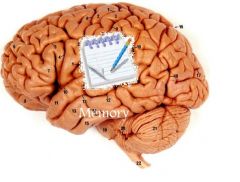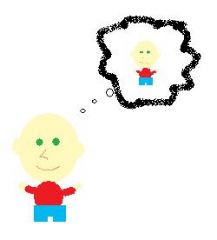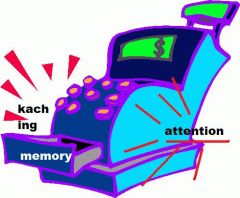![]()
![]()
![]()
Use LEFT and RIGHT arrow keys to navigate between flashcards;
Use UP and DOWN arrow keys to flip the card;
H to show hint;
A reads text to speech;
43 Cards in this Set
- Front
- Back
|
What is the model for the information processing approach?
|
a computer
|
|
|
What does the basic information processing approach emphasize?
|
basic mental processes involved in attention, perception, memory, and decision making
|
|

working memory
|
mental scratch pad that temporarily stores information while actively operating on it
|
|
|
long term memory
|
a relatively permanent store of information that represents what most people mean by memory
|
|
|
encoding
|
getting information into the system
|
|
|
consolidation
|
information if processed and organized in a form suitable for longer term storage.
|
|
|
storage
|
refers to holding information in long term memory store
|
|
|
retrieval
|
the process of getting information out when it is needed
|
|
|
Recognition Memory
|
recognizing something among the options (multiple choice tests)
|
|
|
Recall Memory
|
requires active retrieval without the aid of cues (For example an open ended test question)
|
|
|
implicit memory
|
occurs unintentionally, automatically, and without awareness
|
|
|
explicit memory
|
involves deliberate effortful recollection of events.
|
|
|
__________ memory is tested through traditional recognition and recall tests such as a course's final exam)
|
explicit
|
|
|
problem solving
|
use of the information processing system to achieve a goal or arrive at a decision.
|
|
|
deferred imitation
|
the ability to imitate a novel act after a delay, which clearly requires memory ability.
|
|
|
preservation errors
|
young children have the tendency to continue to use the same strategy even if it was unsuccessful in the past
|
|
|
rehearsal
|
memory strategy of repeating items
|
|
|
organization
|
memory strategy of classifying things into meaningful groups
|
|
|
elaboration
|
creating meaningful links between items remembered
|
|
|
metamemory
|
knowledge of memory and to monitoring and regulating memory processes
|
|
|
What are some ways that infant memory is assesed?
|
imitation, habituation, and long term memory is assessed by operant conditioning
|
|
|
What are the four hypotheses about why memory gets better as a child ages?
|
1. changes in basic capacities
2. changes in memory strategies 3. increased knowledge about memory 4. increased knowledge about the world |
|
|
Children effortlessly remember all sorts of facts (favorite toy, birthdays, etc) what type of memory does this represent?
|
autobiographical memory
|
|
|
childhood amnesia
|
older children have few autobiographical memories of the events that occurred before age 2 or 3
|
|
|
Scripts
|
represent the typical sequence of actions related to an event and guide future behaviors in similar settings
|
|
|
What is sieglers theory of development?
|
rather than picturing development as a series of stages representing stair steps it should be represented as overlapping waves.
|
|
|
consolidation
|
In information processing, the processing and organizing of information into a form suitable for long-term storage.
|
|
|
Old people have more trouble with recognition or recall?
|
recall
|
|
|
Aging has more negative effects on what type of memory? implicit? or explicit?
|
explicit
|
|
|
What is an example of a test measuring explicit memory?
|
cued recall
|
|
|
What is an example of a test measuring implicit memory?
|
fill in the blank
|
|

What is an autobiographical memory?
|
a memory about yourself
|
|
|
What factors influence autobiographical memories?
|
personal significance, distinctiveness, emotional intensity, and life phase of the event.
|
|
|
What is assosciated with better recall?
|
- distinctiveness or uniqueness of an event
- events assosciated with either highly negatigve or highly positive motions |
|
|
What time period do people recall the most information from (except for the present)?
|
their teens and 20s
|
|
|
What are some of the major weaknesses of an older adults memory skills?
|
timed tasks, unfamiliar content, unexercised skills, recall versus recognition, explicit memory tasks
|
|
|
What type of memory declines as someone ages?
|
episodic memory (recall of specific events that are tied to a specific time and place)
|
|
|
What affects children's memory and causes them to misremember information?
|
Scripts -When preschoolers are presented with information inconsistent with their scripts, preschoolers may misremember the information so that it better fits their script.
|
|
|
True or False: Memory is an exact replication.
|
False. It is a reconstruction
|
|
|
utilization deficiency
|
these children can now spontaneously produce a strategy but their task performance does not yet benefit from using the strategy
|
|
|
production deficiency
|
in which children can use strategies they are thought but do not produce them on their own.
|
|
|
fuzzy-trace theory
|
an attempt to explain childhood amnesia, As we age we are more likely to rely on memories that are gists because we lose our memory of specific events so they are fuzzy memories
|
|

sensory register
|
your sensory register will log information and holds it for a fraction of a second as an after image. then it gets registered. attentional processes have to do with this
|

